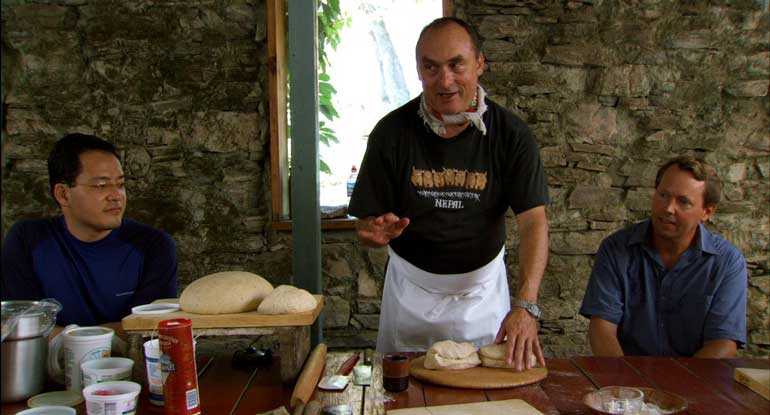Sunday Feb 22, 2026
Sunday Feb 22, 2026
Thursday, 18 July 2019 00:45 - - {{hitsCtrl.values.hits}}

Edward Espe Brown delivering a lesson
This is not at all a philosophical discourse on gender differences, or the complementary roles of yin and yang (women and men) in social or biological formation. This is also not to speak about who is superior among the two. This is just an observation on why perhaps women are ‘traditionally’ more gentle than men, although we like to call the better behaved men, gentlemen. I use the qualification ‘traditionally,’ because it appears that the things are now changing and the traditional differences are slowly vanishing.
The gentle nature or the behaviour of women should be appreciated. I hope all readers would agree with me. We all know about our mothers, how they handled not only day-to-day domestic affairs, but also crucial family challenges when our fathers often failed to take rational decisions. We also know about our sisters, assisting our mothers, and also assisting us, the male brutes when we tried to indulge in foolish adventures within the family or the neighbourhood. 
It was Marquis de Condorcet who said ‘women are simply better than men, gentler, more sensitive and less subject to vices of egoism and hard-headedness’. It was not simply an appreciation of his wife, Sophie, but said so in the process of advocating equal rights for women to vote and acquire political representation. He advocated those during the French Revolution, 130 years ago. I am however not writing on those lines, but what Condorcet talked about as gentle qualities of women, how those are acquired or determined, and how possibly men also could acquire those qualities in the future.
I am giving only one answer today. Do the domestic share of work and particularly cooking! That might at least sober you and calm you down. Violence is not only about killing or hitting another person, but also an emotion that you often cannot control. Of course you cannot ask everyone to cook and calm themselves down. But I am giving only an example in that direction.
It does not appear that gender differences are strictly physical determinants. There are women like men and vice versa. There can be relative determinants making the difference, that they can bear children, that we cannot do, etc. Both nature and nurture play complimentary roles. I am not qualified to talk about natural or genetic factors too much, but my assumption is that ‘social factors, to mean nurture and socialisation, could influence genetic formations’.
Why do I bother about these matters at the last stages of my life? Still curiosity is one reason. A perennial interest of mine is also about how to deal with or find solutions to violence in society.
Women cannot be considered completely free from violence. They at least manage to control their violent tendencies by nature. Men not only fail to do so, but indulge in violence as rather a ‘professional’ preoccupation. Domestic violence is a typical example. One reason is their perception as male and of superiority, and naturally therefore, they tend to compete and fight with their male counterparts and also suppress women folk. They are also the traditional inheritors of wealth and money, and social competition and fighting logically comes from those sources. In the present day society, politics and power are the major reasons for fighting and violence, naturally inherited by men in society than women.
Perhaps all these were rooted in the division of labour between men and women at least 100,000 years ago. While men went hunting, killing animals for food, women were confined to home at best gathering food from living surroundings (of caves) and looking after the children. I am not referring to whether all of them were monogamous or polygamous! What is important is to understand that this division of labour between men and women also was about a division of labour between violence and nonviolence. There is an apparent correlation between animal killing and human killing and violence in society. Even in those primitive societies, human killings originated not just because they were competing or fighting for limited terrain (today of controversial territories), but also because they were in some circumstances used to killing and eating flesh of ‘the other.’ This is not only ancient, but also recent. I had a friend from PNG who used to call himself, humorously of course, ‘I am a son of a cannibal.’
That long history is good enough to create certain genetic characteristics in human bodies and mind that could sustain violence particularly among men; women not completely excluded. One way of ameliorating the situation is to give more prominence for women in decision making, in politics, at home, business and public life. At least giving them the fair share (50%) might do a lot of good for human society than at present.
The genetic conditioning or perhaps an inherent nature of violence particularly in men does not mean that it cannot be changed. Nature and nurture are concomitant factors. A first step in unravelling the quagmire is to understand its existence. In the past several decades, or even before, there have been various social (science) theories in explaining violence. Some of these theories unfortunately are more of justifications than solutions to violence.
‘Why Men Rebel,’ this was a prominent question asked by a prominent social scientist, Robert Gurr, in 1970 in his very title of the book. This was just one year before the JVP violent insurrection in Sri Lanka. His answer was men rebel because they have grievances or frustrations. He built on the famous frustration-aggressions theory. ‘When a personal goal is thwarted, the individual is often compelled to attack the agent of that frustration or the nearest substitute.’ This personal behaviour was elaborated to explain group behaviour as well.
However, Gurr didn’t ask the question whether this is true to both men and women equally. Equality apparently is not the case here, like in many other instances. When a personal goal is thwarted, it appears that women have different or lateral ways of dealing with the problem/s. Aggression is particularly typical of men and not of women.
How come that they have acquired that good quality? My answer perhaps might be rejected by some feminists. They might claim that ‘frustration-aggression theory’ is equally applied to women. They are equal to men in all qualities of life. Why women should be submissive when their goals or rights are obstructed? They might ask. Of course they should not be submissive. My argument or proposition is different. Women have acquired certain discipline, decorum and perseverance that they do not easily indulge in violence or aggression. That is a merit and not a weakness.
This is what I relate to the kitchen and cooking today! In recent times, many countries have ventured to find ways and means in saving young males from violence and aggression. These are mostly Western countries. This is particularly because of domestic violence. The perpetrators of domestic violence are men and not (usually) women. One device that they have developed is coeducation or mix-education. It is relatively true that when boys are educated with girls, often the girls influence the boys and this could generate a balance. Of course there can be evidence also to the contrary.
Another device that many Western countries are now adopting is the introduction of ‘mindfulness training’ in school education. This is like the Buddhist meditation. This kind of simple meditation most definitely can calm down the emotions of youngsters and rationalise their thinking patterns. The usefulness of such devices are not merely relevant to children but also to adults. Universities also should open up and adopt these methods and devices. Universities in Japan are very prominent in utilising meditation and different types of Yoga.
Can there be a connection between meditation and cooking? I first came to realise the connection when I visited the Zen Buddhist Temple, Shunkoln, in Kyoto during my sabbatical in 2006 in Kyoto, Japan. Their tea ceremony rituals were marvellous. ‘If you want to know about yourself deeply, you should know how to make tea and how to serve them to others properly,’ they said.
The connection is most evident from the documentary movie of Zen Monk or Master, Edward Espe Brown’s ‘How to Cook Your Life’. One may argue that things are now commercialised and meditation has become a commodity. However, the connection is clear. Among other things, it says, ‘When steaming rice, regard the pot as your own head; when washing rice, know that the water is your own life.’ This is about mindful cooking and meditation in the process. All these advices are for peaceful, nonviolent and sustainable living.
This is perhaps what our mothers and sisters practiced and knew about throughout ages. This is perhaps why women are most naturally clam, gentler, sensitive and rational without vices of egoism and hard-headedness, as Condorcet claimed. Therefore, the best way to promote peace and nonviolence in society is to promote the women’s way.